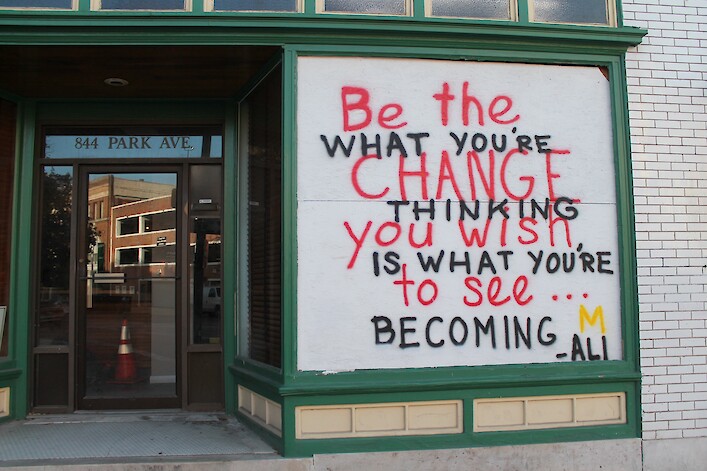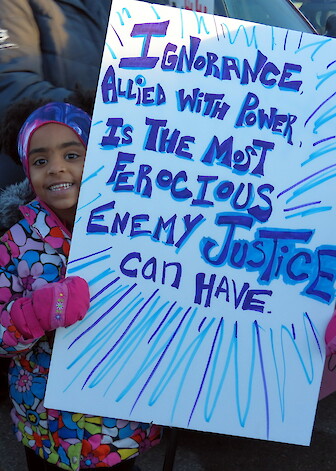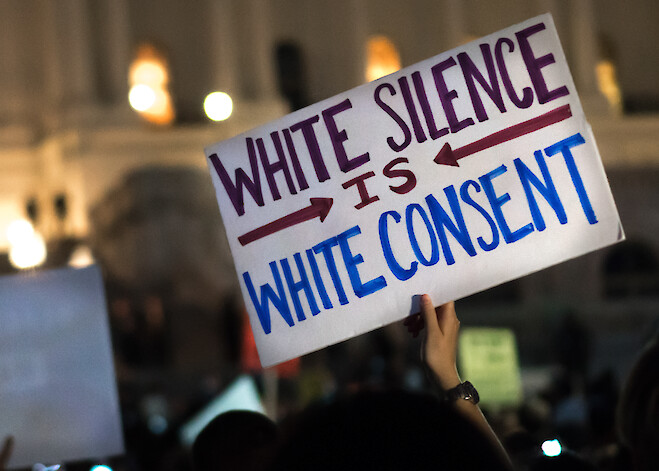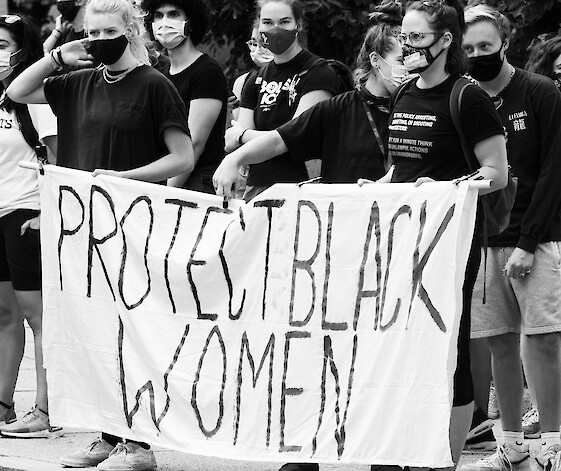I am an Ally but not an Educator: Your Knowledge is Your Responsibility!
Imani Black ·
BE THE CHANGE ... graffiti art at 844 Park Avenue and West Read Street in Baltimore MD on Tuesday afternoon, 8 November 2016. “07a.Change.BaltimoreMD.8November2016” by Elvert Barnes is licensed under CC BY-SA 2.0.
1,870 hours is roughly the amount of time we’ve spent in our MEES 718: Environmental Justice Case Study class so far. From covering topics from the start of the environmental justice movement to questioning high-profile NGO’s minority engagement practices, we’ve touched on a lot of topics. In many ways, I am more knowledgeable now then I was before. And yes, the materials, the readings, and research have played a part in that, but if I’m being completely transparent it’s not a huge piece of the pie. I’m fortunate enough to be in a class composed of some really intelligent and engaging people. I’ve learned so much from them, not just by the work we’ve done together but also by the discussions we’ve had along the way. The depth and transparency of our conversations throughout this course have been the backbone of my Friday afternoons. I’m happy to say that I frequently left our zoom classes thinking, “Wow! Clearly, I have a lot I need to educate myself on.”

Protest March in Rochester, Minnesota. “#BlackLivesMatter” by Rose Colored Photo is licensed under CC BY 2.0.
This past Friday we had our first stakeholder engagement meeting. The primary goal was to receive an outside perspective on our research from environmental “experts.” As a member of this process (and I’m positive my classmates feel the same way), I was grateful for the time and consideration of the stakeholders and their participation. However, if I’m being honest, there was a point in the beginning moments of that conversation that sparked a feeling of dissatisfaction in me. Whether or not I was emotionally heightened or “triggered,” ultimately the issue started with a question from a stakeholder. He said:
“I’m having these conversations [about racial issues and environmental justice] and it’s near and dear to my agency’s heart...I just don’t know a lot about it. When we talk about these topics, I’m really afraid that the language I use and the way I approach things, and not having done it, [I feel like] it’s going to be the wrong way and somehow offensive. Even though I’m doing my best to not be offensive...I always rely on people I’m having these conversations with to let me know when or how to have these hard conservations.”

Rally from the White House to the Capitol, July 2016. “Black Lives Matter” by Victoria Pickering is licensed under CC BY-NC-ND 2.0.
Before I move forward with the underlying conflict I faced with this statement, I want to point out that I don’t think the intention of the question and comments were maliciously delivered in any shape or form. In actuality, some people’s attitudes towards race and people of color (POC) never are. One thing I’ve realized regarding humans, race, or equality is that our “good” intentions at times can be more harmful than helpful. To add to my thought, my classmate replied to the stakeholder with something that made me want to address this situation. She said, “You have acknowledged your ignorance but a lot of that education comes from you...it’s a drain for people of color to have to educate you on these topics so you need to take some of that initiative and also be opened [sic].” At that moment, I realized why this feeling felt so incredibly familiar. As a person of color, I have had this exact conversation over the course of my life with many different people. I’m a firm believer that everyone needs to be more educated on racism, racial politics, and the generational traumas of people of color. But, and that’s a HUGE “but,” it’s not our responsibility to educate or teach others how to erase their perception of racism. The friendly conversation that leads someone to ask me how to talk to people of color about our frequently headlined racial issues and inequalities, in my view, is them asking for the cliff notes to the entirety of my people’s existence.

Black Lives Matter march from Sheridan Circle, D.C., September 12th, 2020. “Black Lives Matter march” by Victoria Pickering is licensed under CC BY-NC-ND 2.0.
My classmate’s comment validated my belief that I don’t owe anyone that conversation. As people of color it is not our job to make others feel comfortable with the racial issues going on today, and we don’t have to feel bad that we’re too exhausted to engage in this commonplace situation. As a Black woman, graduate student, and entrepreneur, I’m tired. I’m tired of being the teacher in spaces where I came to just be me. I’m tired of having to remember that for some, my skin color and their perception of others that look like me is the only information they need to know. Bottom line, the requirement to have these conversations is ultimately education. One conversation with me or another Black person or any other person of color about race will not cure or absolve you from the systemic injustices you benefit from, or the guilt you may feel once you become aware of it. Frankly, it’s insulting that you assume one conversation can help you unlearn a system that has continuously enslaved me and my peers on a daily basis. Not only does it deny us the time to heal and process the racism we’ve experienced but it shows just how far removed you are from the experience that you seek to understand. Let me be more direct—it’s very LAZY of you to approach a conversation about race and not be prepared in 2021, especially if your “curiosity” is the catalyst of the conversation. I never asked to be your educator.
Talking about race will never be easy. If it’s not easy to live through then how do we expect it to be easy to talk about? Before you come to a person of color about these topics, dive into the experiences of the people that have walked before us. Read the words of our heroes, trail blazers, activists, and leaders that worked, struggled, and died for our generations to have the opportunity to be all that we are. All of that matters. Those stories are the foundation of every conversation about race you seek to have, so explore them. Even if you don’t understand, just take the time to make the first step. Learning is about being open to all parts of the conversation: the good, the bad, and the ugly. When talking about race gets tough, emotions may get heightened or you will probably hear something you will not like. But remember, it is a privilege to leave the conversation when you’re not worried about experiencing racism. So stay and listen to these kinds of conversations, even when it stings your ego and forces you to question everything you’ve ever known about the world around you. Once again I appreciate the participation of the stakeholders, but to “skim over” or “be ignorant” about the reality of environmental injustices with today’s technology is a privilege that POC will never experience. Your education on the world around you and how you engage with others in your spaces is your responsibility. For the sake of the environment and the diversity and inclusion movements within, take ownership of your knowledge deficits and biases in your ever-changing journey of compassion and understanding—something that you will probably never fully accomplish.
About the author
Imani Black

Imani Black is a first-year Master’s student at the University of Maryland Center for Environmental Science (UMCES). Imani strives to recognize the historical minority engagement and social barriers in Chesapeake Bay commercial fisheries and how that history has impacted current minority engagement in the industry.